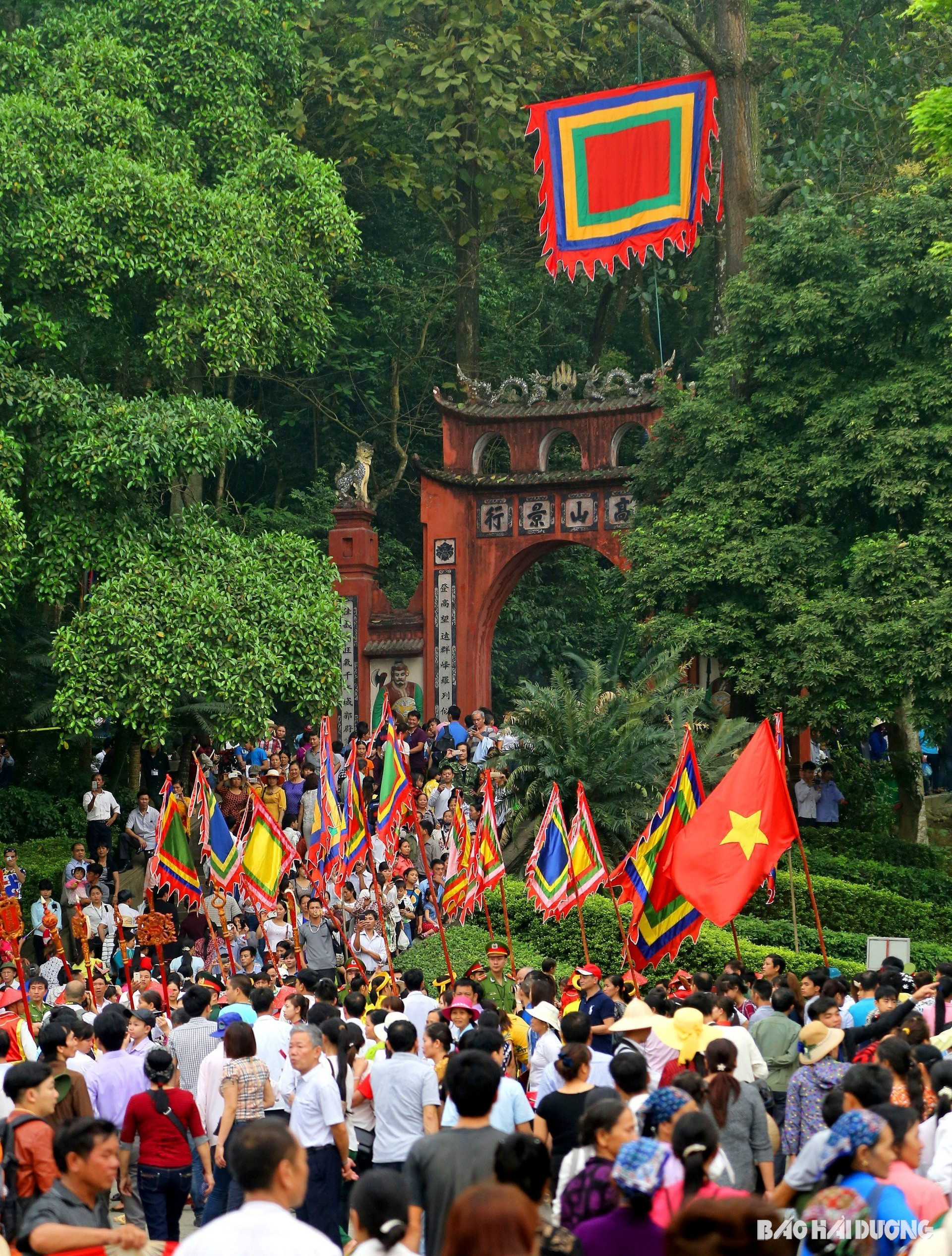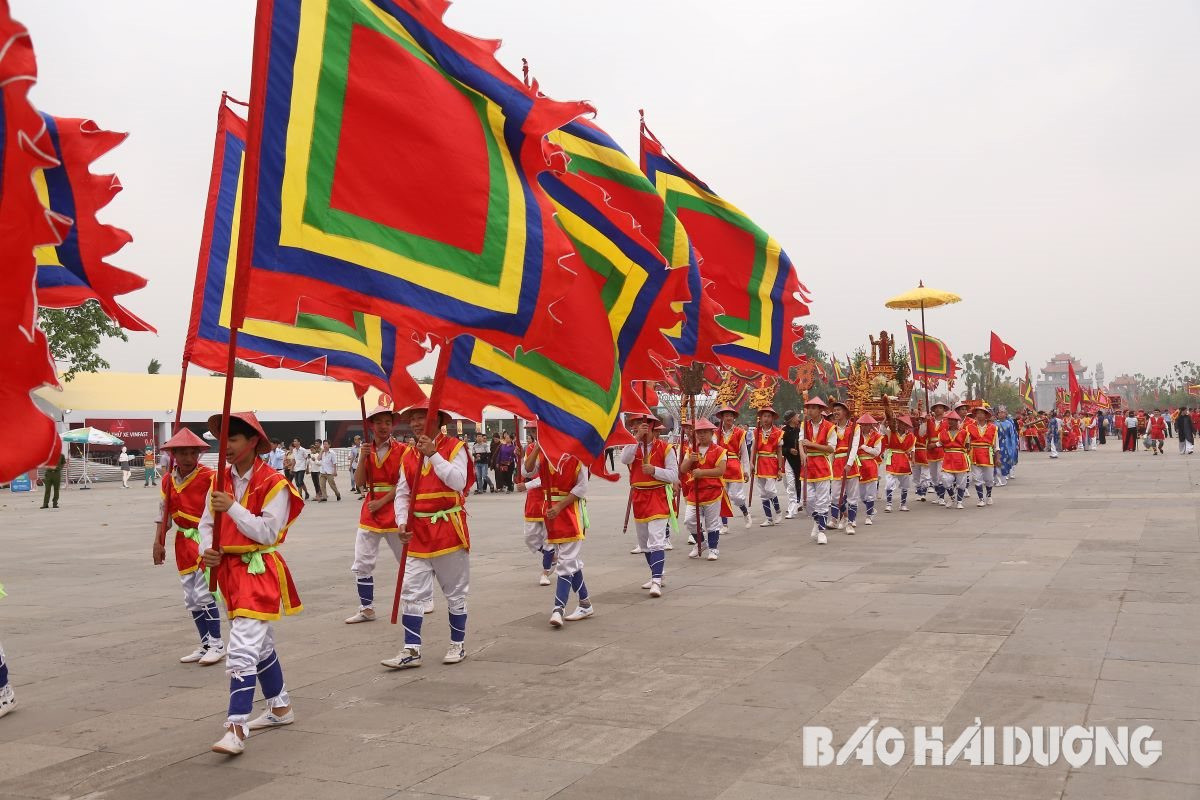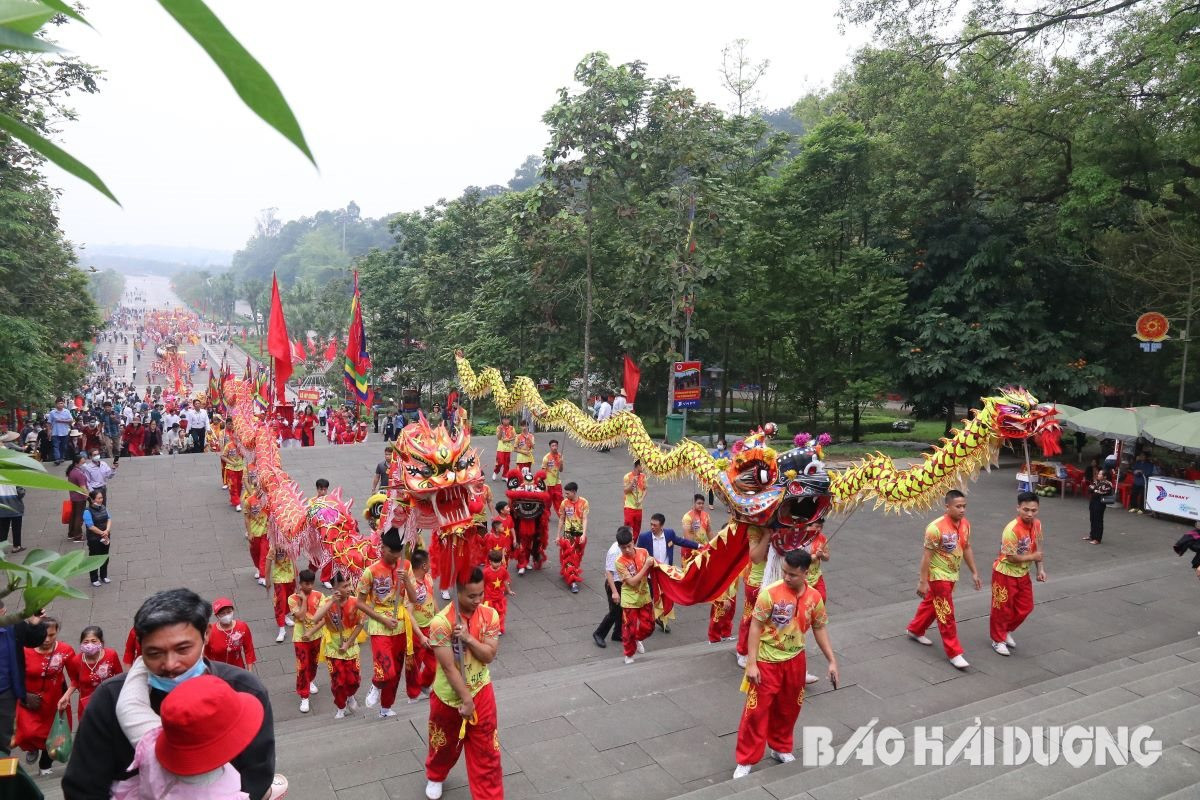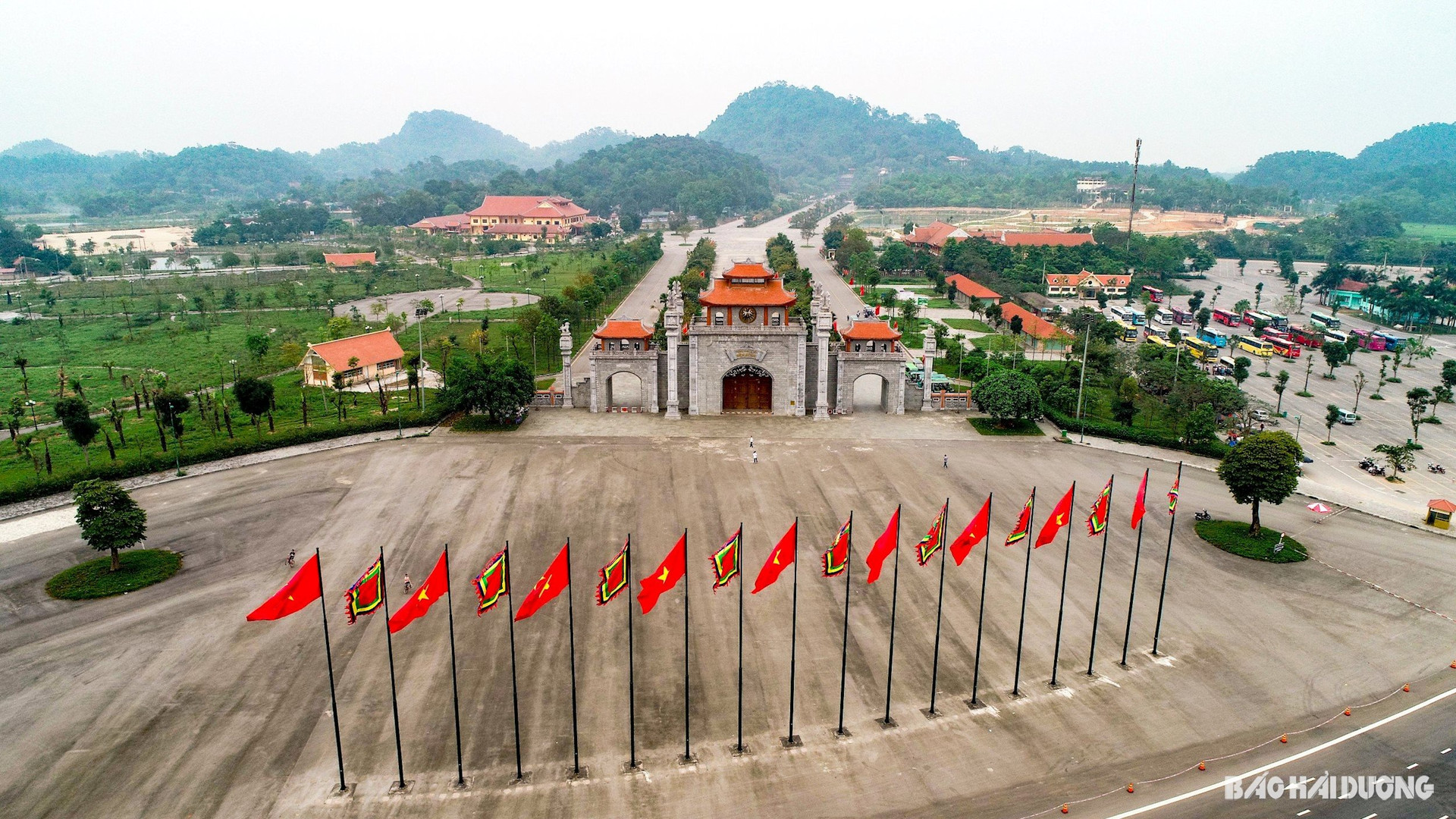The worship of Hung Kings is deeply rooted in the minds of every Vietnamese citizen, becoming a source of pride in the origins of the Lac and Hong descendants, throughout thousands of years of the nation's history.

The Hung King worship is a type of heritage of social customs, beliefs and festivals recognized by UNESCO as a representative intangible cultural heritage of humanity. Holding an important position in the spiritual life of the Vietnamese people, the Hung King worship belief has instilled in the consciousness of every citizen the pride of the origin of the Dragon and the Fairy, throughout thousands of years of history, spreading strongly, becoming a unique cultural identity of the Vietnamese people.
Sustainable spiritual support

Deep in the mind of every Vietnamese person, the Hung Kings are saints, people who built the country, and gods who protect the whole community.
Every time the Hung Kings' Commemoration Day on March 10th comes around, Vietnamese people all over the world look forward to the national holiday - the Hung Kings' Commemoration Day. Over time, the pride and gratitude for the ancestors' merits have spread more and more strongly. More and more people make pilgrimages to the sacred Nghia Linh mountain, especially during the annual Hung Kings' Commemoration Day.
In fact, the Hung Kings' Commemoration Day - Hung Temple Festival has become a popular cultural activity in the lives of the majority of people, becoming a cultural symbol, reflecting the spirit, national consciousness and community connection of the Vietnamese people. The worship of Hung Kings has been deeply ingrained in the consciousness, becoming a sustainable spiritual support, uniting the national community.
Eternal with the nation

The history of the Vietnamese people began with the Hung King era, with the contributions of the Hung Kings in founding the Van Lang state. In recognition of their great contributions, the Vietnamese people have honored the Hung Kings as the ancestors of the nation for thousands of years.
The ancient books “Dai Viet Su Luoc” and “Dai Viet Su Ky Toan Thu” have affirmed and explained the common origin and source of the Vietnamese people - the Hung Kings. In the post-Le period, the first year of Hong Duc, the “Ngoc Pha Hung Vuong” was compiled, stating that “from the Dinh, Le, Ly, Tran dynasties to our current dynasty, Hong Duc post-Le, people still burn incense in the temple in Trung Nghia village (ancient story)”, where people from all over the country come to worship to commemorate the merits of the ancient Holy Ancestor...

During the Nguyen Dynasty, the capital was located in Hue. In 1823, King Minh Mang had the Hung Kings' tablets brought to the Lich Dai De Vuong Temple to be worshiped, and the Hung Temple was granted a title to worship them. The ceremony to organize the Hung Kings' Commemoration Day was specifically and strictly regulated, showing the respect of the dynasties and people for their ancestors.
The August Revolution of 1945 succeeded, the country gained independence, the Party, the State and our people paid special attention to the worship of the Hung Kings - the common ancestors of the nation and focused on investing funds to renovate and embellish the Hung Temple historical relic to make it more spacious, worthy of being a place to worship the common ancestors of the nation. Immediately after the establishment of the Democratic Republic of Vietnam, on February 18, 1946, President Ho Chi Minh issued Decree No. 22C NV/CC regulating major annual holidays, including the Hung Kings' Commemoration Day as a day off. On April 2, 2007, the National Assembly of the Socialist Republic of Vietnam approved the amendment and supplement to Article 73 of the Labor Law allowing employees to take a day off with full pay on the Hung Kings' Commemoration Day (the 10th day of the third lunar month). The annual Hung Kings' Commemoration Day is a major holiday - a national holiday of the whole country and the Government has specific regulations on the scale of organizing the Hung Kings' Commemoration Day in even, round and odd years (Decree No. 82/2001/ND-CP of the Government regulating state ceremonies and welcoming foreign guests).
Through many ups and downs of national history, the worship of Hung Kings has always been passed down, occupying the most sacred position in the spiritual life of the Vietnamese people, having a lasting vitality and increasingly spreading strongly among all classes of people. The endogenous factor of Vietnamese national culture, the worship of Hung Kings has contributed significantly to fostering pride and creating a spirit of solidarity, patriotism, and love for the nation. The Vietnamese people, with the same bloodline of Lac Hong, born from the same mother, have always been preserved and passed down from generation to generation: "Humans have ancestors, have lineage, like trees have roots, like rivers have sources", "Trees have roots, water has sources"...
Spread to all regions

From the top of Hung Mountain - the largest center of Hung King worship in the country, over time, Hung King worship has spread to all regions of the country. First, it was the lands around the foot of Nghia Linh Mountain such as Co Tich communal house (Hy Cuong commune), Treo communal house (Hung Son town), Ca communal house (Tien Kien)... then it spread throughout Phu Tho and Vinh Phuc, almost every district, city and town has temples worshipping Hung Kings, their wives and children, and generals from the Hung King era. From there, it spread to all provinces and cities in the country, concentrated in the provinces of the Northern Delta, the Central region and deep into the Southern land following the footsteps of the Vietnamese people.
According to the Ministry of Culture, Sports and Tourism, the whole country has 1,417 relics worshiping Hung Kings and their wives, children and generals from the Hung King era. In Phu Tho province alone, there are 345 relics associated with the Hung King worship, of which 249 are currently worshiped.
On the anniversary of Hung Kings on the 10th day of the 3rd lunar month every year, along with Phu Tho, localities with Hung Kings worship sites such as Hanoi, Vinh Phuc, Hai Phong, Bac Ninh, Khanh Hoa, Dong Nai, Ho Chi Minh City, Ben Tre, Kien Giang... all solemnly and respectfully hold incense offering ceremonies to commemorate the Hung Kings, expressing gratitude and respect for the Hung Kings' contributions to building the country.
Hung King's death anniversary has truly become a festival for people across the country with many programs, cultural activities, traditional arts, and folk cultural activities of ethnic regions.
Not only in the country but also in some countries around the world, the Vietnamese community abroad also built temples to worship the Hung Kings such as in California (USA), Canada, Australia... or places of worship to place altars, tablets and statues of Hung Kings so that overseas Vietnamese can offer incense to remember their ancestors on national holidays, such as in Russia, Czech Republic, Laos... The "Global Vietnamese National Ancestor Day" is being strongly responded to by the Vietnamese community abroad, becoming a spiritual and cultural support for every Vietnamese person to have the opportunity to remember their national origins and be proud of their origins.
The relics and places of worship of King Hung everywhere are always preserved, maintained and built by Vietnamese people, which is an affirmation of the lasting spiritual value in the spiritual life of the community, the invaluable spiritual baggage of the whole nation to protect, build and develop the country.